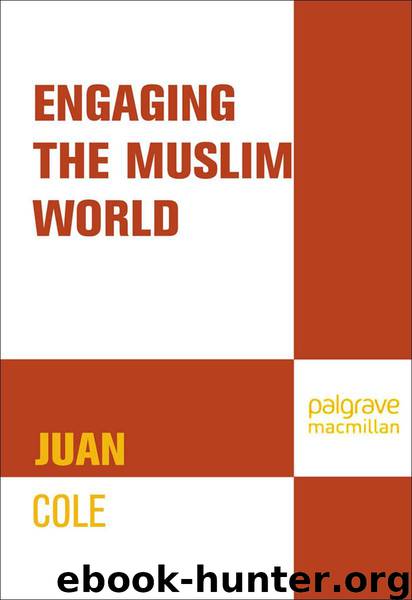Engaging the Muslim World by Cole Juan

Author:Cole, Juan [Cole, Juan]
Language: eng
Format: mobi
Publisher: St. Martin's Press
Published: 2009-03-12T16:00:00+00:00
One of Iraq’s biggest problems—the Kurdish question—so signally lacks a significant religious or Islamic dimension that it has been impossible to portray in the terms of Islam Anxiety, and so U.S. politicians and the press have paid less attention to it. That Iraqis might have mainly secular, subnationalist conflicts with one another in which religion is largely irrelevant defies the conceptual framework erected by the Bush administration. But downplaying these ethnic problems is dangerous, because they may constitute the biggest powder keg of all.
The Kurds have the Peshmerga paramilitary, said to be tens of thousands of fighters strong, which is designated in the new Iraqi constitution as the National Guard for Kurdistan. Although Islam and sectarianism are constantly invoked by commentators on the problems in Iraq, political Islam has been weak in the Kurdish regions. Jalal Talabani of the Patriotic Union of Kurdistan, who became the president of Iraq in 2005, is a socialist and a regular attendee at Socialist International conferences. His sometime rival and current partner, Massoud Barzani of the Kurdistan Democratic Party, is a relatively secular nationalist. The Kurdistan Islamic Union is the next biggest party, but it holds only 5 of 58 Kurdish seats in the Iraqi Parliament.
Iraq as it now stands is an “asymmetrical federal” state.62 That is, special autonomy is granted to the three provinces of Irbil, Dohuk, and Sulaimaniya, which have joined together in a single superprovince, the Kurdistan Regional Government (KRG). The special prerogatives of Iraqi Kurdistan are greater than in most such federal systems, such as Canada’s (in which Quebec has special status). The Kurds want to extend their Kurdistan to at least parts of three more northern provinces and have in fact stationed their Peshmerga troops well beyond their borders in Iraq proper. They want the oil province of Kirkuk to be in this Kurdistan and to annex parts of Diyala and Ninevah provinces (or perhaps the entirety of these provinces) on the grounds that these three have substantial Kurdish populations. The other major ethnic groups in Iraq oppose this Kurdish expansionism.
Interethnic violence, among Kurds, Arabs, and Turkmen, is already occurring in Kirkuk and Mosul, but it is not massive. A greatly heightened interethnic conflict provoked by the expansion of Kurdistan poses the threat not only of domestic instability in the north but also of outside intervention. Turkey views the Turkmen as brethren and would intervene to save them from a massacre if there were extensive violence with the Kurds. Al-Maliki’s new assertiveness, which led him to send Iraqi troops into the northern areas of contested Diyala Province, provoked a crisis in late summer 2008. In largely Kurdish cities such as Khanaqin, the Peshmerga were already supplying security, and their presence signaled the interest of the Kurdistan Regional Government in ultimately annexing those cities. Al-Maliki, by sending in government troops, was implicitly reclaiming them for the central government. The confrontation led KRG president Barzani to complain bitterly about al-Maliki’s aggressiveness and failure to honor earlier commitments to Kurdistan’s prerogatives (such
Download
This site does not store any files on its server. We only index and link to content provided by other sites. Please contact the content providers to delete copyright contents if any and email us, we'll remove relevant links or contents immediately.
| Arms Control | Diplomacy |
| Security | Trades & Tariffs |
| Treaties | African |
| Asian | Australian & Oceanian |
| Canadian | Caribbean & Latin American |
| European | Middle Eastern |
| Russian & Former Soviet Union |
The Secret History by Donna Tartt(19028)
The Social Justice Warrior Handbook by Lisa De Pasquale(12182)
Thirteen Reasons Why by Jay Asher(8883)
This Is How You Lose Her by Junot Diaz(6872)
Weapons of Math Destruction by Cathy O'Neil(6261)
Zero to One by Peter Thiel(5782)
Beartown by Fredrik Backman(5734)
The Myth of the Strong Leader by Archie Brown(5491)
The Fire Next Time by James Baldwin(5423)
How Democracies Die by Steven Levitsky & Daniel Ziblatt(5211)
Promise Me, Dad by Joe Biden(5139)
Stone's Rules by Roger Stone(5078)
A Higher Loyalty: Truth, Lies, and Leadership by James Comey(4946)
100 Deadly Skills by Clint Emerson(4911)
Rise and Kill First by Ronen Bergman(4775)
Secrecy World by Jake Bernstein(4738)
The David Icke Guide to the Global Conspiracy (and how to end it) by David Icke(4696)
The Farm by Tom Rob Smith(4500)
The Doomsday Machine by Daniel Ellsberg(4481)
